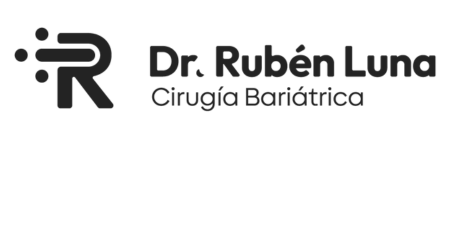Reflux After Bariatric Surgery

When considering bariatric surgery as a weight-loss tool, it’s important to be aware of the potential side effects. Reflux, also known as acid reflux or gastroesophageal reflux disease (GERD), is one such complication that some individuals may experience after undergoing bariatric surgery.
Reflux occurs when stomach acid flows back into the esophagus, causing discomfort and potentially damaging the lining of the esophagus over time. This condition can lead to symptoms such as heartburn, chest pain, regurgitation of acid, and difficulty swallowing.
It’s essential for people planning to undergo bariatric surgery to have a thorough understanding of the risks and potential complications involved. By being informed, patients can work with their healthcare providers to develop strategies to manage and minimize the occurrence of reflux after surgery.
Reflux After Bariatric Surgery, Key Takeaways:
- Reflux, or acid reflux, is one of the possible side effects of bariatric surgery.
- It occurs when stomach acid flows back into the esophagus, causing symptoms like heartburn and regurgitation.
- Understanding the risks and potential complications of reflux after bariatric surgery is crucial for managing and minimizing its occurrence.
- Working closely with healthcare providers can help develop strategies to address and alleviate reflux symptoms after surgery.
- Proactive measures, such as lifestyle modifications and medication, may be recommended to manage reflux after bariatric surgery.
Understanding Reflux after Bariatric Surgery
Reflux after bariatric surgery can be a concerning issue for patients on their weight loss process. Understanding the causes and mechanisms behind reflux after bariatric surgery is crucial for effective management and post-op gastric reflux care.
After undergoing bariatric surgery, changes in the gastrointestinal anatomy and physiology can contribute to the development of reflux. The alteration in the structure of the stomach and the positioning of the gastroesophageal junction can disrupt the normal flow of stomach contents, leading to gastric reflux.
There are several factors that can increase the risk of experiencing reflux after weight loss surgery. These include obesity, pre-existing gastroesophageal reflux disease (GERD), hiatal hernia, and the type of bariatric procedure performed. It is important to consider these factors when managing reflux after weight loss surgery.
Awareness and proactive management of reflux symptoms are essential to prevent complications and optimize outcomes for individuals who have undergone bariatric surgery. Post-op gastric reflux care involves a comprehensive approach, including lifestyle modifications, medications, and, in some cases, surgical interventions if conservative measures are ineffective.
«Proper management of reflux after bariatric surgery significantly improves patient satisfaction and quality of life.»
Common Symptoms of Reflux After Bariatric Surgery
Common Symptoms of Reflux After Bariatric Surgery
Reflux after bariatric surgery can lead to various symptoms that can significantly impact an individual’s quality of life. Here, I will show you the common symptoms experienced by individuals who develop reflux after their weight loss surgery.
Acid Regurgitation:
One of the telltale signs of reflux after bariatric surgery is the backflow of stomach acid into the esophagus, resulting in a sour or acidic taste in the mouth.
Heartburn
Some people may experience a burning sensation in the chest, often referred to as heartburn, due to the irritation of the esophagus caused by acid reflux.
Heartburn
Some people may experience a burning sensation in the chest, often referred to as heartburn, due to the irritation of the esophagus caused by acid reflux.
Dysphagia
Reflux after bariatric surgery can also lead to difficulty in swallowing (dysphagia) as the inflamed esophagus becomes narrower and more prone to obstruction.
Chest Pain:
Some individuals may experience chest pain or discomfort, which can be mistaken for a heart problem. It is essential to differentiate between reflux-related chest pain and other cardiac conditions.
«Reflux after bariatric surgery is not only limited to acid regurgitation and heartburn. Dysphagia and chest pain can also be significant indicators of ongoing esophageal reflux. It is crucial to recognize and address these symptoms promptly.» Dr Ruben Luna
In addition to the symptoms mentioned above, patients who develop reflux after bariatric surgery may also experience complications related to gastroesophageal reflux disease (GERD). These complications can include esophageal strictures, Barrett’s esophagus, and even esophageal cancer.
If you are experiencing any of these symptoms after your bariatric surgery, it is important to consult with your healthcare provider for a proper evaluation and management plan. Addressing reflux symptoms promptly can help prevent further complications and improve your overall well-being.
Diagnostic Tools for Reflux After Bariatric Surgery
In order to accurately diagnose reflux after bariatric surgery, healthcare professionals utilize various diagnostic tools to identify the underlying causes and evaluate the severity of the condition. These tools play a crucial role in determining the most suitable treatment approach for each patient’s unique situation.
Endoscopy
One of the primary diagnostic procedures for reflux after bariatric surgery is endoscopy. This minimally invasive procedure involves inserting a thin, flexible tube with a camera into the esophagus, allowing the doctor to examine the esophageal lining for any signs of inflammation, irritation, or structural abnormalities.
pH Monitoring
pH monitoring is another commonly used diagnostic tool for assessing reflux after bariatric surgery. During this procedure, a small tube is inserted through the nose or mouth into the esophagus to measure the pH levels and detect any abnormal acid exposure. By monitoring the pH levels, doctors can determine the frequency and duration of acid reflux episodes.
Manometry
In some cases, manometry may be performed to evaluate the pressure and muscle function of the esophagus. This diagnostic test involves inserting a thin, flexible tube with pressure sensors through the nose or mouth and into the esophagus. The sensors measure the strength and coordination of the esophageal muscles, aiding in the diagnosis of any motility disorders that may contribute to reflux.
Treatment Options for Reflux After Bariatric Surgery
After undergoing bariatric surgery, it is not uncommon for individuals to experience reflux symptoms. However, there are various treatment options available to manage and alleviate these symptoms, allowing patients to enjoy the benefits of their weight loss journey.
Lifestyle Modifications

- Implementing dietary modifications, such as avoiding trigger foods and incorporating smaller, more frequent meals.
- Managing body weight through healthy eating habits and regular physical activity to reduce pressure on the stomach.
- Practicing positional changes, such as avoiding lying down immediately after eating, to minimize acid reflux.
Medications
- Proton pump inhibitors (PPIs) can be prescribed to reduce stomach acid production and alleviate reflux symptoms.
- H2 blockers may also be recommended to decrease the amount of acid produced by the stomach.
Surgical Interventions:
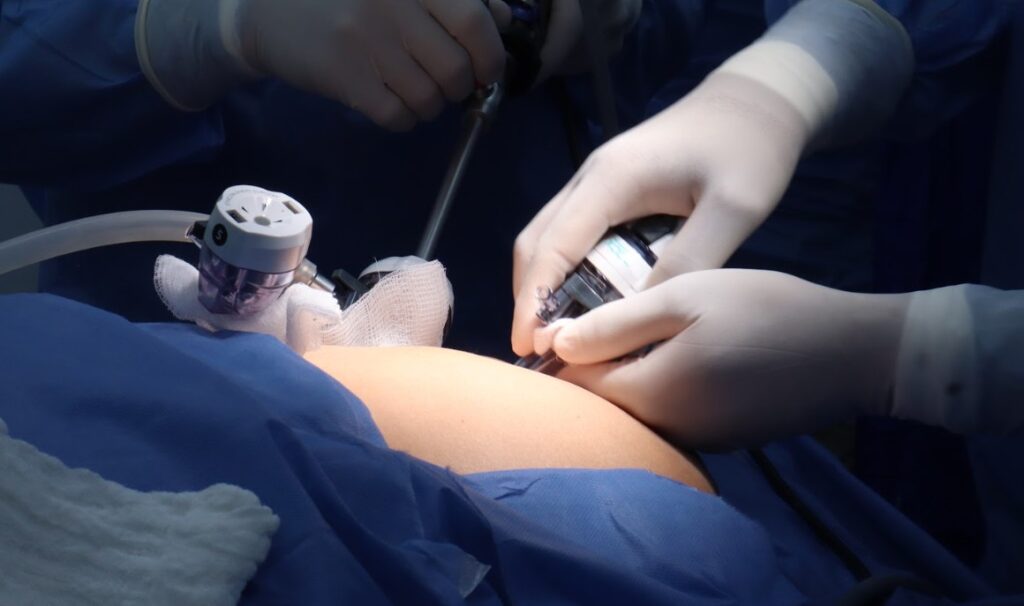
- In cases where conservative measures fail to provide relief, surgical options such as revisional bariatric surgery or anti-reflux procedures can be considered to address severe reflux symptoms.
Surgical Interventions for Reflux After Bariatric Surgery
When conservative measures fail to adequately relieve severe reflux symptoms after bariatric surgery, surgical interventions may be considered as a treatment option. These surgical procedures aim to address the underlying causes of reflux and provide long-term relief.
Revisional Bariatric Surgery
In some cases, the initial bariatric surgery may need to be revised to alleviate reflux symptoms. This can involve altering the anatomy of the gastrointestinal tract to restore normal function and reduce acid reflux. Revisional procedures are typically performed by experienced bariatric surgeons who specialize in managing complications.
Anti-reflux Procedures
Anti-reflux procedures are specifically designed to address the symptoms of reflux after bariatric surgery. One such procedure is the Nissen fundoplication, which involves wrapping the top of the stomach around the lower esophagus to strengthen the valve between the stomach and the esophagus, thereby reducing acid reflux. Another option is the LINX device, a magnetic ring placed around the lower esophagus that helps prevent acid from flowing back into the esophagus.
Reflux after bariatric surgery in Colombia
Dr. Ruben Luna, a highly skilled bariatric surgeon in Colombia, stands out as the best choice for addressing reflux after bariatric surgery. With his extensive expertise in revisional surgery for reflux diseases, Dr. Luna is well-equipped to help patients manage and overcome the challenges associated with acid reflux post-bariatric surgery.
As a pioneer in the field, Dr. Luna understands the importance of tailoring treatment plans to each individual’s unique needs. He employs state-of-the-art technology, such as the BioBeat remote monitoring system, to closely monitor his patients’ progress and ensure optimal outcomes. This cutting-edge approach allows Dr. Luna to detect and address any potential complications early on, providing his patients with the highest level of care and support.
Dr. Luna’s commitment to his patients’ well-being extends beyond the operating room. He works closely with each individual to develop a comprehensive plan that includes lifestyle modifications, dietary advice, and medication management when necessary. By taking a holistic approach to treating reflux after bariatric surgery, Dr. Luna empowers his patients to achieve long-lasting relief and improved quality of life.
Dr. Ruben Luna: Pioneer in Remote Monitoring for International Bariatric Patients
Dr. Ruben Luna, a renowned bariatric surgeon in Colombia, stands out as the only specialist in the country offering a unique service that ensures the safety and well-being of his international patients. Through his innovative Remote Monitoring Program, Dr. Luna provides a comprehensive solution for patients who travel to Colombia to undergo bariatric surgery and need to return to their home countries shortly after the procedure.
Understanding the concerns and challenges faced by international patients, Dr. Luna has implemented a cutting-edge remote monitoring system that allows him to closely monitor their health status, even from afar. This pioneering approach sets Dr. Luna apart from other bariatric surgeons in Colombia, as he goes above and beyond to ensure the safety and peace of mind of his patients.
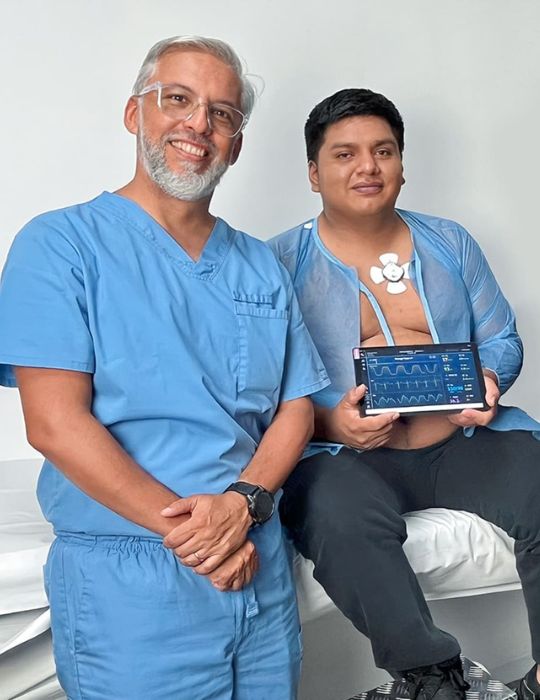
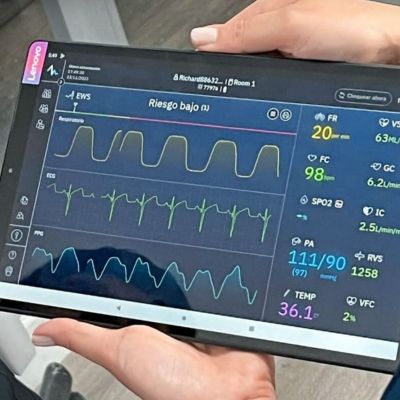
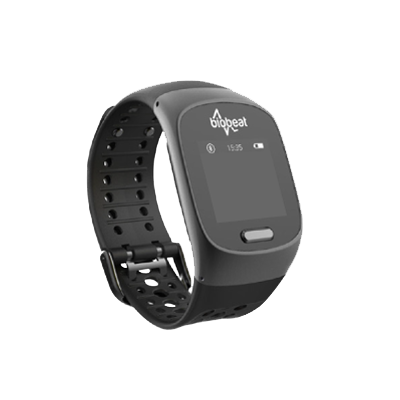
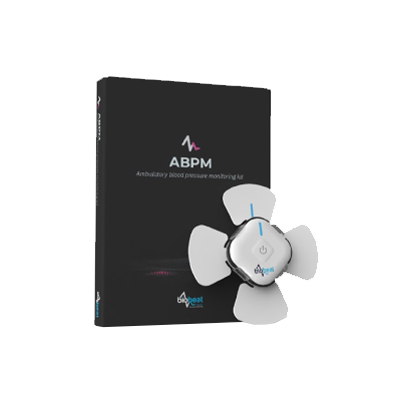
FAQs About Reflux After Bariatric Surgery
What is reflux after bariatric surgery, and why does it occur?
Reflux after bariatric surgery, also known as acid reflux or gastroesophageal reflux disease (GERD), is a condition where stomach acid flows back into the esophagus, causing discomfort and potential damage to the esophageal lining. It occurs due to changes in the gastrointestinal anatomy and physiology after weight loss surgery, which can disrupt the normal flow of stomach contents.
What are the common symptoms of acid reflux post-bariatric surgery?
Common symptoms of acid reflux post-bariatric surgery include acid regurgitation (a sour or acidic taste in the mouth), heartburn (a burning sensation in the chest), dysphagia (difficulty swallowing), and chest pain or discomfort.
How can I manage reflux symptoms after weight loss surgery?
To manage reflux symptoms after weight loss surgery, you can make lifestyle modifications such as adopting a healthy diet, avoiding trigger foods, maintaining a healthy weight, and adjusting your posture and sleeping position. In some cases, medications like proton pump inhibitors (PPIs) or H2 blockers may be prescribed to reduce acid production and alleviate symptoms.
What lifestyle modifications can help prevent heartburn after bariatric surgery?
Lifestyle modifications that can help prevent heartburn after bariatric surgery include avoiding trigger foods (e.g., spicy, fatty, or acidic foods), eating smaller, more frequent meals, staying upright for at least two hours after eating, and elevating your upper body when sleeping.
When should I consider medications for treating reflux after bariatric surgery?
You should consider medications for treating reflux after bariatric surgery when lifestyle modifications alone are not sufficient to manage your symptoms. Your healthcare provider may recommend medications such as PPIs or H2 blockers to reduce stomach acid production and provide relief.
What are the best medications for managing reflux after bariatric surgery?
The best medications for managing reflux after bariatric surgery include proton pump inhibitors (PPIs) like omeprazole (Prilosec) and pantoprazole (Protonix), H2 blockers such as ranitidine (Zantac) and famotidine (Pepcid), and prokinetic medications like metoclopramide (Reglan). Your healthcare provider will determine the most suitable medication based on your individual needs and medical history.
How can Dr. Ruben Luna's expertise help me address reflux after bariatric surgery?
Dr. Ruben Luna, as the best bariatric surgeon in Colombia, has extensive expertise in addressing reflux after bariatric surgery. He employs a comprehensive approach that includes lifestyle modifications, medication management, and, when necessary, revisional surgery to help patients overcome the challenges associated with acid reflux post-bariatric surgery.
What makes Dr. Ruben Luna the best bariatric surgeon in Colombia for treating reflux?
Dr. Ruben Luna is considered the best bariatric surgeon in Colombia for treating reflux due to his unparalleled expertise, use of advanced technology like BioBeat remote monitoring, and compassionate care. He tailors treatment plans to each individual’s unique needs and works closely with patients to ensure optimal outcomes.
How does Dr. Ruben Luna's approach to revisional bariatric surgery differ from others?
Dr. Ruben Luna’s approach to revisional bariatric surgery for reflux differs from others in that he uses state-of-the-art technology, such as the BioBeat remote monitoring system, to closely monitor patients’ progress and detect potential complications early on. This allows him to provide the highest level of care and support, ensuring the best possible outcomes for his patients.
What is BioBeat remote monitoring, and how does it benefit bariatric surgery patients?
BioBeat is a remote monitoring system that allows Dr. Ruben Luna to closely track his patients’ progress after bariatric surgery. This technology enables him to detect and address any potential complications early on, providing patients with the highest level of care and support. By using BioBeat, Dr. Luna can ensure optimal outcomes and help patients achieve long-lasting relief from reflux symptoms.
When should I consider revisional surgery for reflux after bariatric surgery?
You should consider revisional surgery for reflux after bariatric surgery when conservative measures, such as lifestyle modifications and medications, fail to adequately relieve severe reflux symptoms. Consult with a qualified bariatric surgeon like Dr. Ruben Luna to evaluate your condition and determine if revisional surgery is the most appropriate option for you.
What are the risks and benefits of undergoing revisional surgery for reflux?
The benefits of undergoing revisional surgery for reflux include long-term relief from reflux symptoms and improved quality of life. However, as with any surgical procedure, there are risks involved, such as bleeding, infection, and complications related to anesthesia. Dr. Ruben Luna will thoroughly discuss the risks and benefits with you to help you make an informed decision.
How can I schedule a consultation with Dr. Ruben Luna to discuss my reflux symptoms?
To schedule a consultation with Dr. Ruben Luna, you can contact his office directly or visit his website to find the appropriate contact information. During the consultation, Dr. Luna will assess your reflux symptoms, medical history, and discuss potential treatment options with you.
What can I expect during a comprehensive reflux treatment plan with Dr. Ruben Luna?
During a comprehensive reflux treatment plan with Dr. Ruben Luna, you can expect a thorough evaluation of your symptoms, lifestyle, and medical history. Dr. Luna will then develop a personalized plan that may include lifestyle modifications, dietary advice, medication management, and, if necessary, discussion of surgical options. He will work closely with you to ensure the best possible outcome.
How effective is Dr. Ruben Luna's approach in helping patients overcome acid reflux challenges post-bariatric surgery?
Dr. Ruben Luna’s approach to helping patients overcome acid reflux challenges post-bariatric surgery is highly effective. His expertise, use of advanced technology, and compassionate care have helped numerous patients achieve long-lasting relief from reflux symptoms and improved quality of life.
What are the potential complications of untreated reflux after bariatric surgery?
Potential complications of untreated reflux after bariatric surgery include esophageal strictures (narrowing of the esophagus), Barrett’s esophagus (pre-cancerous changes in the esophageal lining), and, in rare cases, esophageal cancer. Seeking prompt medical care and adhering to recommended treatment plans are crucial for preventing these complications.
How does Dr. Ruben Luna's expertise extend beyond the operating room in managing reflux?
Dr. Ruben Luna’s expertise extends beyond the operating room in managing reflux by providing comprehensive care that includes lifestyle and dietary advice, medication management, and close monitoring of patients’ progress. He takes a holistic approach to ensure the best possible outcomes for his patients.
What sets Dr. Ruben Luna apart as the best choice for addressing reflux after bariatric surgery in Colombia?
What sets Dr. Ruben Luna apart as the best choice for addressing reflux after bariatric surgery in Colombia is his combination of extensive expertise, use of cutting-edge technology like BioBeat remote monitoring, and dedication to providing compassionate, individualized care to each patient.
How can I prepare for a bariatric surgery consultation with Dr. Ruben Luna?
To prepare for a bariatric surgery consultation with Dr. Ruben Luna, gather your medical records, including any relevant test results or imaging studies. Make a list of your symptoms, medications, and questions you may have for Dr. Luna. Be prepared to discuss your medical history, lifestyle habits, and goals for treatment.
What should I do if I experience severe reflux symptoms after bariatric surgery?
If you experience severe reflux symptoms after bariatric surgery, contact your healthcare provider or Dr. Ruben Luna’s office immediately. Severe symptoms may include difficulty swallowing, chest pain, or persistent vomiting. Seeking prompt medical attention can help prevent complications and ensure that you receive the appropriate treatment.


